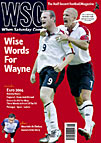 Like Wayne Rooney, Paul Gascoigne once returned home a hero from an international tournament. But his new autobiography offers a stark account of a talent subsequently wasted and personal problems ignored. Harry Pearson describes a troubling read
Like Wayne Rooney, Paul Gascoigne once returned home a hero from an international tournament. But his new autobiography offers a stark account of a talent subsequently wasted and personal problems ignored. Harry Pearson describes a troubling read
The Paul Gascoigne who stares out from the cover of this long-awaited (it was commissioned six years ago) autobiography bears a strong resemblance to fellow Nineties casualty Shaun Ryder. There are other similarities, too: talent, loutish behaviour, wild acclaim, drugs, craziness, rehab and, at the end of it all, a greatest hits package that, however enjoyable, never quite adds up to a career.
From Gascoigne fully establishing himself in the England team with a memorable goal against Czechoslovakia to his final, chaotic expulsion from the squad in La Manga is a period of just eight years. After it his football life was, more or less, slowly dying – five goals spread over seven seasons spent at five different clubs. Add to that the fact that in the three-and-a-half years between the spring of 1991 and the autumn of 1994 the midfielder managed just 53 games for Lazio; and that after leaving Tottenham when he was 25 years old he never played 30 league matches in a season again; and however hard Gazza may deny it in this at times painfully honest and at other times just plain painful book, it is impossible not to feel a sense of immense talent wasted.
Could it have been different? You would certainly hope so, but it’s a question of ifs and maybes. Much has been made of Gascoigne’s dysfunctional family (and, yes, they do seem to have stepped straight out of the pages of Viz) but the family of football is if anything even madder and more psychotic than the Dunston clan. Like an absent dad the clubs lavish their juvenile charges with gifts (at Lazio Gascoigne demanded – and was given – his own trout farm) but offer little in the way of emotional support, discipline or sound advice.
The chances of anybody involved in the game recognising that the hyperactive, obsessive, attention-seeking Gascoigne – whose every madcap prank comes with a whiff of desperation – needed help, let alone acting on that knowledge until it was way, way too late, were seemingly negligible; after all, by his own account, while at Rangers Gazza regularly helped himself to a morphine substitute from the Ibrox medical cabinet without any of the staff noticing.
Until Bryan Robson reacted to Gazza’s attempted suicide at Stevenage station, the only manager who actually did anything to try and address the player’s mental problems was England manager Glenn Hoddle. And he, naturally, decided the right treatment was to send him to see Eileen Drewery. Brilliant.
By this stage Gascoigne was an alcoholic and a wife-beater. He deals with both in these pages with a self-lacerating frankness. That he makes no attempt to elicit the reader’s sympathy is to his credit. He clearly feels he deserves none and in the latter case at least he is right.
Gazza makes little attempt to explain his behaviour and the abusive relationship with Sheryl remains enigmatic. As Gascoigne says more than once, he prefers to be out with the lads rather than chasing women. Perhaps it is unsurprising therefore that his most successful relationship is with another man, his best chum and current flatmate Jimmy “Five Bellies” Gardner.
Not that things have always been easy for the pair, especially for Gardner. During the course of this book Gascoigne attempts to shoot an apple off Jimmy’s head with a crossbow, pays him £25 a time for allowing him to fire airgun pellets into his arse, deliberately runs him over, feeds him a pie filled with human excrement, throws a feral cat on to his face while he is asleep and gives him £1,000 in return for the pleasure of watching him set fire to his own nose. Perhaps most cruelly of all, with his mate up in court having threatened some kids with a gun, Gazza arranges for Chris Evans to testify as a character witness. And yet through it all their friendship has endured: Gazza and Five Bellies – the Posh ’n’ Becks of Tyneside. It is one of the few heartwarming aspects of what is otherwise a cautionary tale.
From WSC 210 August 2004. What was happening this month